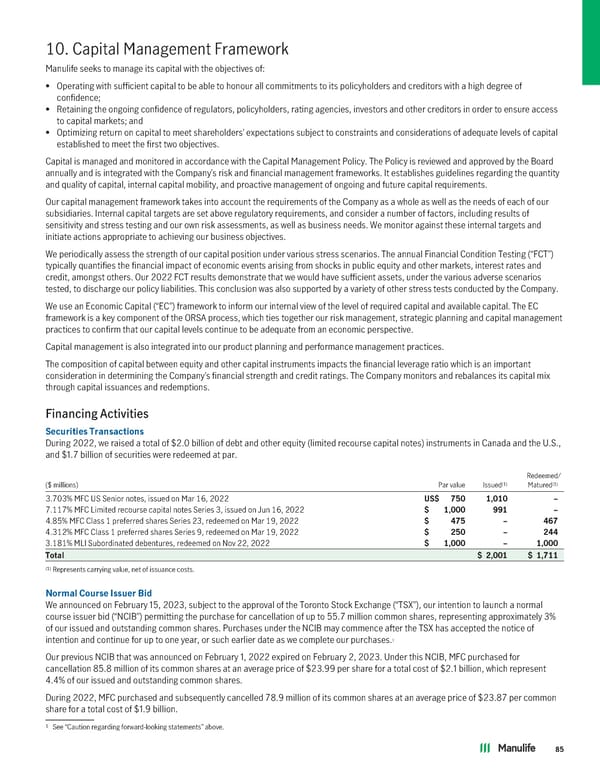10. Capital Management Framework Manulife seeks to manage its capital with the objectives of: • Operating with sufficient capital to be able to honour all commitments to its policyholders and creditors with a high degree of confidence; • Retaining the ongoing confidence of regulators, policyholders, rating agencies, investors and other creditors in order to ensure access to capital markets; and • Optimizing return on capital to meet shareholders’ expectations subject to constraints and considerations of adequate levels of capital established to meet the first two objectives. Capital is managed and monitored in accordance with the Capital Management Policy. The Policy is reviewed and approved by the Board annually and is integrated with the Company’s risk and financial management frameworks. It establishes guidelines regarding the quantity and quality of capital, internal capital mobility, and proactive management of ongoing and future capital requirements. Our capital management framework takes into account the requirements of the Company as a whole as well as the needs of each of our subsidiaries. Internal capital targets are set above regulatory requirements, and consider a number of factors, including results of sensitivity and stress testing and our own risk assessments, as well as business needs. We monitor against these internal targets and initiate actions appropriate to achieving our business objectives. We periodically assess the strength of our capital position under various stress scenarios. The annual Financial Condition Testing (“FCT”) typically quantifies the financial impact of economic events arising from shocks in public equity and other markets, interest rates and credit, amongst others. Our 2022 FCT results demonstrate that we would have sufficient assets, under the various adverse scenarios tested, to discharge our policy liabilities. This conclusion was also supported by a variety of other stress tests conducted by the Company. We use an Economic Capital (“EC”) framework to inform our internal view of the level of required capital and available capital. The EC framework is a key component of the ORSA process, which ties together our risk management, strategic planning and capital management practices to confirm that our capital levels continue to be adequate from an economic perspective. Capital management is also integrated into our product planning and performance management practices. The composition of capital between equity and other capital instruments impacts the financial leverage ratio which is an important consideration in determining the Company’s financial strength and credit ratings. The Company monitors and rebalances its capital mix through capital issuances and redemptions. Financing Activities SecuritiesTransactions During 2022, we raised a total of $2.0 billion of debt and other equity (limited recourse capital notes) instruments in Canada and the U.S., and $1.7 billion of securities were redeemed at par. Redeemed/ (1) (1) ($ millions) Par value Issued Matured 3.703% MFC US Senior notes, issued on Mar 16, 2022 US$ 750 1,010 – 7.117% MFC Limited recourse capital notes Series 3, issued on Jun 16, 2022 $ 1,000 991 – 4.85% MFC Class 1 preferred shares Series 23, redeemed on Mar 19, 2022 $ 475 – 467 4.312% MFC Class 1 preferred shares Series 9, redeemed on Mar 19, 2022 $ 250 – 244 3.181% MLI Subordinated debentures, redeemed on Nov 22, 2022 $ 1,000 – 1,000 Total $ 2,001 $ 1,711 (1) Represents carrying value, net of issuance costs. NormalCourseIssuerBid We announced on February 15, 2023, subject to the approval of the Toronto Stock Exchange (“TSX”), our intention to launch a normal course issuer bid (“NCIB”) permitting the purchase for cancellation of up to 55.7 million common shares, representing approximately 3% of our issued and outstanding common shares. Purchases under the NCIB may commence after the TSX has accepted the notice of 1 intention and continue for up to one year, or such earlier date as we complete our purchases. Our previous NCIB that was announced on February 1, 2022 expired on February 2, 2023. Under this NCIB, MFC purchased for cancellation 85.8 million of its common shares at an average price of $23.99 per share for a total cost of $2.1 billion, which represent 4.4% of our issued and outstanding common shares. During 2022, MFC purchased and subsequently cancelled 78.9 million of its common shares at an average price of $23.87 per common share for a total cost of $1.9 billion. 1 See “Caution regarding forward-looking statements” above. 85
 2022 Annual Report Page 86 Page 88
2022 Annual Report Page 86 Page 88